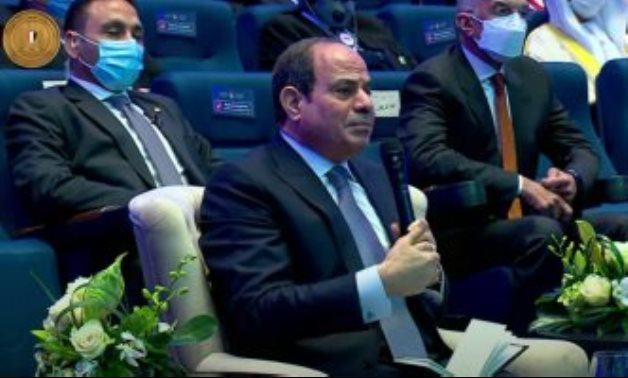
President Abdel Fatah al-Sisi at the 2nd Global Forum for Higher Education (GFHS) organized by ISESCO in New Capital. December 8, 2021. TV screenshot
CAIRO – 8 December 2021: President Abdel Fatah al-Sisi said Wednesday that extremism has obstructed accomplishing development programs in many developing states.
That was during his attendance of a panel discussion on the implications of the fourth and fifth industrial revolutions taking place within the 2nd Global Forum for Higher Education (GFHS).
The event is held by the Islamic World Education, Scientific and Cultural Organization (ISESCO) and hosted by Egypt in the New Administrative Capital on December 8-10. The country is also hosting the 14th general conference of the organization.
The Egyptian president inaugurated the forum having 49 states as participants and where the rising need for new skills mandated by COVID-19 is being discussed. The program of the forum includes lectures by academics and a study fair.
The president added that the quality of "education for all" in developing countries has not been the same as that in developed ones. That’s why Egypt is now keen on introducing joint programs with international universities, he underlined.
“We want to keep up with the latest developments in education so please cooperate with us,” the Egyptian president said addressing Western educational establishments.
Egypt’s Minister of Higher Education and Scientific Research Khaled Abdel Ghaffar guided a tour in the Egyptian pavilion at the study fair pointing out that six local technology universities will enter service soon.
The minister added that research centers have been introduced in Egypt in the sectors of petroleum and electronics, and that the latter will begin operation soon. He pointed out that Egyptian students who seek higher education abroad fell from 4,600 to 2,200 in the current academic year attributing the cause to the introduction of new quality universities in Egypt.
Minister Abdel Khafar later delivered a speech at the forum's opening noting the salience of making education cope with technology advancement in the industrial sector.
Then, ISESCO Secretary General Salem al-Malik thanked Egyptian president, and higher education minister for hosting the forum. Malik specified four factors that would ensure quality higher education. Those are freedom and independence; reliable funding; harmony between curricula and market needs; and, partnerships with reputable employers.
In the panel discussion, Planning Minister Hala al-Said highlighted the OECD remarks showing that automation puts 14 percent of jobs at risk obsolescence, and changes the required skills to do 32 percent of others.
Speaking about Egypt, the planning minister showcased that students at technical education schools get internships at ongoing national projects in a bid to help them acquire skills needed in the market.
With regard to the expansion of online education, CEO of Coursera USA Jeff Maggioncalda noted that the closure of universities during COVID-19 made the number of students on the platform soar to 90 million up from 47 million. He highlighted that many of those are lecturers at medical schools, and that Coursera offers around 4,000 courses.
As for soft skills, President of Royal College of Physicians and Surgeons of Glasgow Mike McKirdy pointed out that emotional intelligence has become key in treatment plans offered to cancer patients.
Comments
Leave a Comment